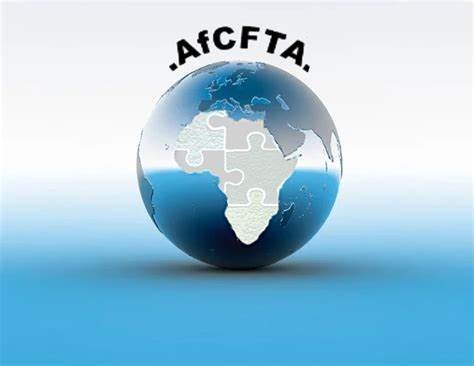The African Union (AU) Assembly has created and adopted key protocols and decisions concerning the Africa continental Free Trade Area (AfCFTA). The government of President Cyril Ramaphosa has welcomed it. “These include the first-ever Protocol on Women and Youth in trade, as well as protocols on Investment and on digital trade,” said Minister in the Presidency Khumbudzo Ntshavheni. The protocol on Women and Youth in trade aims to promote sustainable and inclusive socioeconomic development, provide equal opportunity for women and youth in intra-Africa trade, and the structural transformation of African economies. Ntshavheni was addressing the media on Thursday on the outcomes of the Cabinet meeting held the previous day. She stated that the Assembly, attended by Ramaphosa, also agreed to several rules of origin on clothing and certain automobile products. (All Africa.com)
The president is hopping that AfCFTA will be the mechanism that will put South Africa on the map with the BRICS nations of Brazil, Russia, India and China. South Arica is the fifth member to join the group and is also regarded as the gateway to the Southern African Development Community (SADC). As a member of the AU and a signatory to AfCFTA its strength increases. The new protocols including women and the youth reflects the entrepreneurial spirit of peoples of the continent and shows the necessity of inclusivity in the free market. Women and the youth have a back bone role to play in all economies both on the continent and the world. This is especially true of women and youth in the rural areas who have experience with subsistence farming.
President of Ghana Nana Akufo- Addo arrived in South Africa last month for a working visit during which he co-chaired the second session of the South Africa-Ghana Bi-National Commission (BNC) with his counterpart President Cyril Ramaphosa. The first session of the BNC was held in 2021 in Accra, Ghana, when Ramaphosa visited the country. During that session, the two countries signed various memoranda of understanding in different areas, including agriculture, trade and investment. In his remarks at the session, Ramaphosa expressed his government’s willingness to work with Accra under the auspices of the AU to address the challenges facing the continent such as conflict and instability, the erosion of democracy, and economic hardships. He said there was need for both countries to expedite the implementation of the 24 cooperation agreements signed since 2021. (IOl)
Ramaphosa further said that the revoking of Visa requirements for ordinary passport holders for a period of three months between Ghana and South Africa had increased the movement of people between their countries.(IOL)
AfCFTA is about linking the peoples of the continent across the divide through trade. It is about linking African land-locked nations to the coastal nations with access to the sae. Free trade is about improvising technology and infrastructure through accessible borders. It provides for the free movement of peoples, goods and services. This is why it is called free trade. However, this form of trade needs to also be fair to everyone participating in it. This is why over sight and cooperation are important tools to ensuring everyone shares in this prosperity. South Africa has found a significant partner in Ghana to facilitate interest in trade and investment. Such an agreement is not just an agreement but also a partnership and marriage of alliance between the two countries. Pretoria under Ramaphosa and Accra are now in an alliance to ensure their nations benefit from the free trade agreement.
The end of Visa requirements for Ghana and South Africa changes the ball game and shows the interest in having open borders. The purpose of AfCFTA is to build bridges and connections through out Africa and with the world. It will be the lens that will determine how South Africa and Africa are seen by the world.
Article written by:
Yacoob Cassim
Journalist at Radio Al Ansaar


